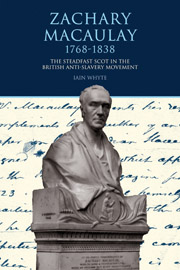Book contents
- Frontmatter
- Contents
- Foreword
- Acknowledgements
- Abbreviations
- List of Illustrations
- Chronology
- Introduction
- 1 From Inverary to the Sierra Leone River
- 2 Slave Traders and French Invaders
- 3 Captive in Love—to Selina Mills
- 4 The Trials of the Governor
- 5 Caught in a Multitude of Tasks
- 6 Clapham, Family and Friends
- 7 Attempting to Win France for Abolition
- 8 ‘Let Us Look it Up in Macaulay’—The Anti-Slavery Arms Manufacturer
- 9 Commerce and Conflict
- 10 Triumph and Tragedy on the Path to Glory
- 11 As Others Saw Him—As We Might Assess Him
- Bibliography
- Index
1 - From Inverary to the Sierra Leone River
- Frontmatter
- Contents
- Foreword
- Acknowledgements
- Abbreviations
- List of Illustrations
- Chronology
- Introduction
- 1 From Inverary to the Sierra Leone River
- 2 Slave Traders and French Invaders
- 3 Captive in Love—to Selina Mills
- 4 The Trials of the Governor
- 5 Caught in a Multitude of Tasks
- 6 Clapham, Family and Friends
- 7 Attempting to Win France for Abolition
- 8 ‘Let Us Look it Up in Macaulay’—The Anti-Slavery Arms Manufacturer
- 9 Commerce and Conflict
- 10 Triumph and Tragedy on the Path to Glory
- 11 As Others Saw Him—As We Might Assess Him
- Bibliography
- Index
Summary
On the morning of 18 April 1833, 300 delegates from all over the United Kingdom carried an Address to the Prime Minister at Downing Street calling for the immediate abolition of slavery in the British Empire. This was a far cry from the earlier cautious attempts to ‘mitigate’ or improve conditions for those enslaved, alongside the hope of future emancipation that had been tentatively suggested in 1823. Now, a decade later, there was an unequivocal demand for the ending of this system, which seemed to challenge British ideals, Christian principles and civilised practice. Petitioning had by then become a familiar lobbying tactic, yet a political march in which leading civic and ecclesiastical figures took part and converged on the Prime Minister's residence was, to say the least, unusual. However, delegates had been carefully nominated and chosen by the numerous anti-slavery societies throughout Britain.
According to a contemporary account, they comprised ‘merchants, squires, bankers, magistrates, clergymen, and dissenting ministers'. The address was drawn up and presented by Joseph Gurney, Quaker banker, brother of a prison reformer and brother-in-law of Sir Thomas Fowell Buxton, William Wilberforce's successor as the leader of the anti-slavery cause in Parliament. Having agreed the text of the Address at Exeter Hall, by then a renowned venue for public meetings on slavery, they proceeded as a body to the Prime Minister's residence.
- Type
- Chapter
- Information
- Zachary Macaulay 1768-1838The Steadfast Scot in the British Anti-Slavery Movement, pp. 5 - 27Publisher: Liverpool University PressPrint publication year: 2011

